After four rounds of voting, Lindsay Hoyle was elected as Speaker of the House yesterday (04/11/19) with 325 votes. Having has served as Deputy Speaker since 2010, he had been the favourite to win the role. Chris Bryant came a distant second with 213 votes in the final round.
Hoyle made an emphasis on neutrality a central part of his campaign. Unlike others running, he did not reveal which way he had voted in the 2016 referendum, and has never publicly declared whether he backed Leave or Remain. Since both the Speaker and the Deputy Speaker by convention do not vote on motions, he did not have to pick a side when either May or Johnson brought their deal to the Commons. After winning the vote, he told the House: “As I’ve promised, I will be neutral, I will be transparent.”
The 62-year-old, with a warm and friendly demeanour, is expected to employ a less grandiloquent style than his predecessor John Bercow. His perceived neutrality made him a welcome choice for many MPs: a number of Brexiteers had claimed that Bercow’s selection of amendments revealed a pro-Remain bias. Bercow had also been accused of flaunting his Remainer credentials by driving his wife’s car which displayed a “Bollocks to Brexit” sticker. Hoyle aims to return to a time when the role was seen as less politicised.
A number of other challenges face Hoyle in his time as Speaker. He will be overseeing the restoration of Parliament, which is expected to take at least 6 years and will be a costly and complicated process. He will also be responsible for building on previous efforts to establish an independent system to investigate complaints against MPs. At the end of Bercow’s time as Speaker, numerous allegations against MPs were still outstanding, including accusations of bullying against Bercow himself.
Following tradition, Hoyle had to be dragged to the Speaker’s chair by other MPs. The Speaker-elect customarily demonstrates reluctance at being chosen because of the danger historically associated with the role when it involved conveying the Commons’ opinions to the monarch. Speaking from the chair, he paid tribute to his daughter, who passed away in 2017. “There’s one difficult part I want to get over”, he said. “There is one person who is not here: my daughter Natalie. I wish she had been here. We all miss her as a family, no more so than her mum Miriam.”




